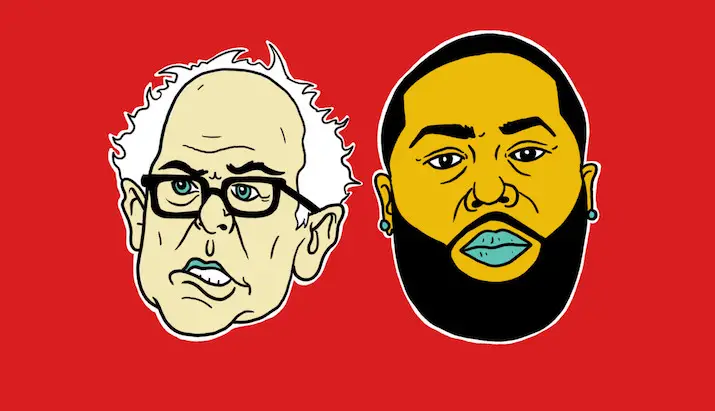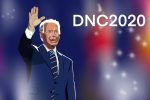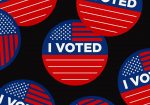Millennials Enjoy the Bern
From the perspective of a 20-year-old voter who plans to go with Bernie Sanders.
By Jenna Ramsey, Seattle University
At the Democratic Presidential debate last Sunday, Hillary Clinton was asked why Sen. Bernie Sanders is beating her 2-1 among younger voters.
Unsurprisingly, she gave a sort of non-answer.
“I’m going to keep working as hard as I can to reach as many people of all ages about what I will do with the experience and the ideas that I have that I will bring to the White House,” she said. “I hope to have their support when I’m the Democratic nominee.”
Of course she didn’t have an explanation; if she did, the problem would be solved by now, right?
I think the question would be better directed to the young people themselves. Here are four reasons—from my perspective as a 20-year-old Democrat—why Hillary doesn’t have my generation’s vote.
1. Social Media Can’t Cut It
Hillary seems to think that when choosing a candidate, millennials pay more attention to social media than to policy.
I say this because her most obvious attempts to get our attention specifically are in the form of lighthearted multimedia posts online—most of which contain some fun, relatable phrase like “pantsuit game strong” or “just chillin'” to remind us that Hillary knows what we’re about.
It’s a weird, ineffective tactic; I’ve never heard of anyone changing their vote over an Instagram post or a re-tweeted meme. Most of the people I know from my age group either have strong political opinions or couldn’t care less about politics—there’s little gray area.
There are those of us in the 18-to-29 demographic who are excited to vote and will make a careful decision based on personal beliefs, and there are those of us who won’t vote at all. A painfully awkward Snapchat video probably isn’t going to sway anyone either way.
Obviously a Presidential candidate should at least pretend to keep up with advances in technology, but it would be nice if Hillary spoke directly to younger voters more often from the debate stage rather than online.
2. Celebrity Spokespeople Matter
Compare the effectiveness of rapper Killer Mike and writer/actress Lena Dunham, two influential stars who have vocally supported Bernie and Hillary’s campaigns. Lena interviewed Hillary in September, and Killer Mike invited Bernie for a talk in his hometown of Atlanta, Georgia in November. The differences between these interviews are glaring.
The problem with using Lena to connect Hillary with the average young adult is that Lena represents a voice that Hillary is already so familiar with. Both of them know the general experience of growing up as a white female from a middle-class American family.
Other than a gap in age, what are they offering each other in terms of discussion? When Lena facilitates the dialogue between Hillary and young America, the voices and concerns of minorities are inevitably ignored.
In contrast, Killer Mike challenges Bernie with questions from his own perspective as a black American man. The talk is rewarding because it doesn’t feel like an advertisement for Bernie so much as an honest conversation about how Killer Mike became a supporter, and what issues the two of them agree and disagree on, given their different backgrounds.
3. Hillary’s Past
Hillary entered this race with a huge advantage: she was already a household name. But this comes with the unfortunate side effect that her past—past mistakes, past opinions, past public image—follows her everywhere.
The Clintons have been in the spotlight for as long as millennials have been on Earth. While most of us have only just gotten to know Bernie over the past year, we’ve had our whole lives to develop an opinion of Hillary.
Unfortunately, she hasn’t been able to shake the old, sexist descriptions of her “cold” personality, and for many young voters, the likability factor just isn’t there.
You can tell when Hillary speaks—in one-on-one interviews as well as during the debates—that she knows how closely her words are being examined. This is largely out of her control. The amount of time she’s been in the public eye makes it that much easier for interviewers and other candidates to attack her with questions and accusations about her past.
She is careful for a good reason, but it’s hard to get excited about a candidate who is so clearly trying not to step on any toes. Bernie’s animated, candid speaking style is refreshing in comparison.
4. Young People Want Change
Hillary and Bernie’s opinions overlap on several key issues that directly impact the young voter. They agree that college tuition should be lowered significantly, that the federal minimum wage should be raised and that affordable health care should be considered a basic human right. But their approaches to solving some issues differ pretty dramatically.
The difference is that Bernie wants what he calls a “political revolution.” He wants to adopt a single-payer health care program, make public colleges tuition-free, and stop billionaire donors from funding political campaigns, among other things.
His goals, however realistically achievable they may or may not be, suggest big changes for the country. On the other hand, Hillary’s plan is to stay on track with what the Obama administration has already begun.
In 2008, Barack Obama promised change, and it inspired voters enough to get him elected. Bernie may not surge ahead of Hillary the way Obama was able to eight years ago, but it seems that young people are responding to his ideas with a similar level of excitement.
Bernie’s campaign has received the biggest number of independent donations in the country’s history. He’s not winning in percentages, but he clearly has the monopoly on enthusiasm.
Simply put, Hillary’s campaign feels stale the second time around, especially when compared to Bernie’s. Even her slogan, “Hillary for America,” sounds uninspired next to “Feel the Bern.”
Hillary’s answer to getting the younger vote seems to be that she’ll wait it out until young Democrats have no choice after she beats Bernie in the primaries. But who’s to say Bernie’s voters will even show up for Hillary at the general election? It’s probably not a question Hillary should ignore anymore.


















Times have change, celebrities don’t have the power with politician like they used too, there own lives are so screw up, there no trusted with these celebrities anymore